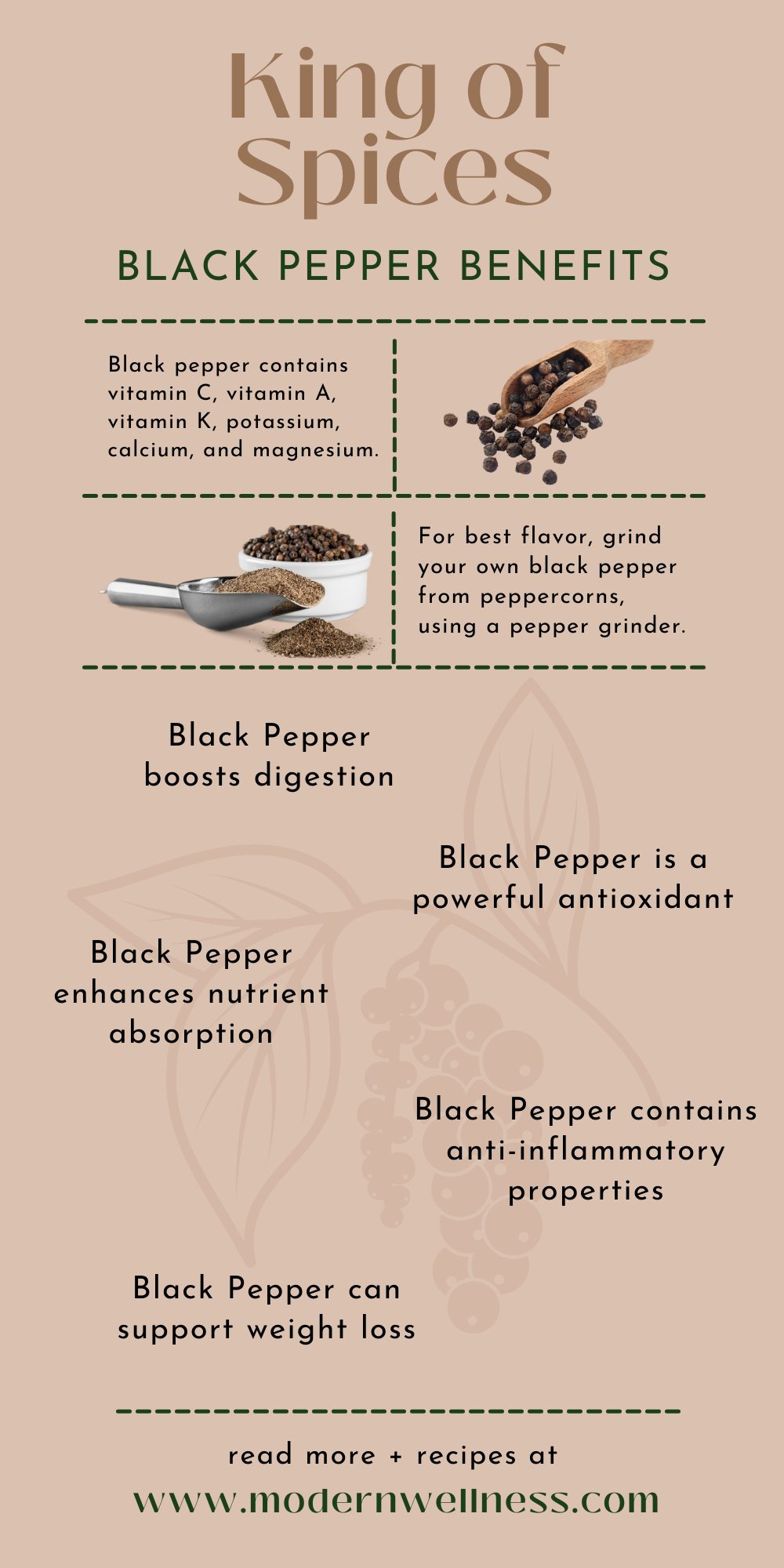Black Pepper Heath Benefits: The King of Spices

Black pepper (Piper nigrum), often referred to as the “King of Spices,” has been a staple in kitchens around the world for centuries. However, beyond its culinary appeal, black pepper offers a myriad of health benefits that are often overlooked. This spice, which originates from the tropical forests of India, contains active compounds with powerful antioxidant, anti-inflammatory, and digestive properties. Today, we’ll explore the wellness benefits of black pepper, making a case for why it’s more than just a flavor enhancer in your meals.
Nutritional Profile of Black Pepper
Black pepper is rich in vitamins, minerals, and essential oils, making it a nutrient-dense addition to any diet. It contains:
- Vitamins: Vitamin C, Vitamin A, and Vitamin K.
- Minerals: Potassium, calcium, and magnesium.
- Phytochemicals: Piperine, a key compound that gives black pepper its spicy heat and is responsible for many of its health benefits.
Health Benefits of Black Pepper
1. Boosts Digestion
Black pepper stimulates the stomach to secrete more hydrochloric acid, which is essential for the digestion of proteins and other food components. By enhancing digestive function, it helps prevent bloating, constipation, and indigestion.
Moreover, its carminative properties make black pepper useful for reducing gas buildup in the intestines.
2. Powerful Antioxidant
The piperine in black pepper acts as a potent antioxidant, helping to neutralize free radicals and prevent cellular damage. Free radicals contribute to oxidative stress, which is linked to various chronic diseases, including heart disease, cancer, and diabetes.
3. Enhances Nutrient Absorption
One of the most remarkable benefits of black pepper is its ability to improve the bioavailability of other nutrients. Piperine enhances the absorption of various vitamins and minerals, including Vitamin B, selenium, and beta-carotene, making the nutrients in your food more effective.
In fact, piperine is often combined with other supplements, such as curcumin (found in turmeric), to significantly increase their absorption in the body.
4. Anti-inflammatory Properties
Chronic inflammation is a driving factor behind many diseases, including arthritis, asthma, and heart disease. Piperine has been shown to exhibit anti-inflammatory effects, reducing inflammation and pain associated with chronic conditions.
5. Supports Weight Loss
Piperine may play a role in weight management by inhibiting the formation of new fat cells, a process known as adipogenesis. It also enhances fat metabolism, making it easier for the body to burn fat and use it as energy.
How to Incorporate Black Pepper into Your Wellness Routine
Including black pepper in your daily diet is easy and beneficial. You can:
- Sprinkle it over salads, soups, and sauces.
- Combine it with turmeric in golden milk to enhance curcumin absorption.
- Add a pinch of black pepper to smoothies or teas for an antioxidant boost.
For a more concentrated approach, black pepper essential oil can be used in aromatherapy or diluted with a carrier oil for topical application to soothe sore muscles.
Conclusion
Black pepper is more than just a common spice; it is a powerhouse of health benefits. From boosting digestion and fighting inflammation to increasing the absorption of essential nutrients, this spice has earned its title as the “King of Spices” for a good reason. Incorporating black pepper into your diet or wellness routine is an easy way to tap into its impressive health properties, supporting your overall well-being.
References
- Srinivasan, K. (2007). Black pepper and its pungent principle-piperine: A review of diverse physiological effects. Critical Reviews in Food Science and Nutrition, 47(8), 735-748.
- Dorman, H. J., & Deans, S. G. (2000). Antioxidant properties of black pepper (Piper nigrum L.) in animal models. Food and Chemical Toxicology, 38(2), 121-127.
- Shoba, G., Joy, D., Joseph, T., Majeed, M., Rajendran, R., & Srinivas, P. S. (1998). Influence of piperine on the pharmacokinetics of curcumin in animals and human volunteers. Planta Medica, 64(4), 353-356.
- Wadhwa, R., et al. (2015). Anti-inflammatory role of piperine in arthritis. European Journal of Pharmacology, 740, 172-177.
- Koo, S., et al. (2012). Inhibitory effect of piperine on adipogenesis and fat accumulation in 3T3-L1 cells. Journal of Agricultural and Food Chemistry, 60(2), 385-392.

You must be logged in to post a comment.